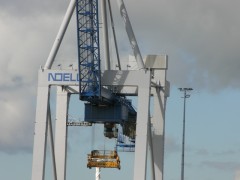Study: NZ Ports Inefficient
 New Zealand ports may rank towards the bottom end of the ports of developed countries as efficiency improvements in the industry appear to have stalled, according to a report out this afternoon.
New Zealand ports may rank towards the bottom end of the ports of developed countries as efficiency improvements in the industry appear to have stalled, according to a report out this afternoon.
The study by Dr Brent Layton, a researcher and former director of the NZ Institute of Economic Research, says reforms in Australia, including the privatisation of most port operations, have seen the efficiency of Australian ports improve and exceed that of some major New Zealand ports.
There had been major improvements in the efficiency of our ports following reforms in the late 1980s and early ‘90s. These included the corporatisation of the former harbour boards, partial listing of some port companies on the sharemarket, and waterfront labour reforms. At the time it was expected that most port companies would eventually be privately owned.
The study, released by the Local Government Forum, finds that the industry’s problems are not mainly an inadequate return on capital. Most ports have made positive economic retains, although there has been a sharp deterioration in the economic returns of Ports of Auckland, particularly since it was effectively nationalised by the Auckland Regional Council in 2005. Rather, the study finds that the problems of local authority ownership are reflected mainly in the barriers to port rationalisation and the introduction of experienced international operators into the management of ports.
The study suggests four policy options for examination:
- Increased information disclosure
- Contestability in container stevedoring where practical
- Separation of the roles of port landlord and stevedoring services as in Australia
- Divestment of shares in port companies to encourage more efficient operations and rationalisation.
The Customs Brokers and Freight Forwarders Federation president Willie van Heusden said the report suggesting council control of ports is a barrier to efficiency and stifles competition, “hit the nail on the head”.
“It’s inevitable that ports will be rationalised but the current situation, with many under local body ownership, is stifling that and stifling the potential of many ports to make a major contribution to the economic development of the regions.
“Port mergers would be in the best interests of both the economic viability of the regions and of New Zealand Incorporated. It would enable management to get the best out of the supply chain and maximise productivity.”











5 Comments
Where can we see this report?
@ dsadasgdf654645 Local Govt says the 60pg report will be on http://www.localgovtforum.org.nz soon.
I love it how none of the recommendations for improving efficiency are anything to do with actual operations. How useful.
NZIER is a neoliberal front group. As noted, none of the recommendations highlighted above say anything about “how”. The idea simply is “privatise, the market will do it better”. What a waste of our time - but something likely to be government policy in a few years, once they get their grubby hands on Auckland.
What about the massive payments Auckland has gotten from its ports ownership? They probably deducted that in their understanding of profits?
Or the fact that the new Auckland Council CAN in fact decide freely how to develop the waterfront (past squabbling between Council and ARC aside because they will now be one entity)?
Or how about voters just simply don’t WANT their recommended solutions to all and everything?